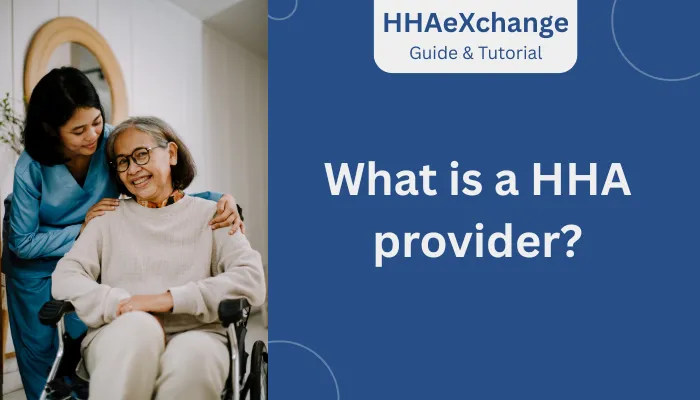One question that stands out is, What is a HHA provider? A Home Health Aide (HHA) provider delivers essential care to individuals in their homes, supporting those who need assistance with daily tasks.
Platforms like HHAeXchange, a leading software solution, streamline care coordination for these providers. In this blog, I’ll share my insights to explain this vital role clearly and engagingly. Let’s dive into the world of HHA providers!

Understanding the Role of a HHA Provider
I’ve always admired the compassion behind caregiving, and understanding what is a HHA provider? starts with their core responsibilities. HHA providers are trained professionals who assist clients—often elderly, disabled, or recovering from illness—with daily activities in their homes.
Key Responsibilities of HHA Providers
HHA providers perform a variety of tasks to ensure clients live comfortably and safely. Here’s what I’ve seen them do:
- Personal Care: Assisting with bathing, dressing, and grooming.
- Health Monitoring: Checking vital signs like blood pressure or temperature.
- Household Support: Light housekeeping, meal preparation, and laundry.
- Companionship: Offering emotional support and social interaction.
- Mobility Assistance: Helping clients move safely around their homes.
These tasks make a huge impact, allowing clients to maintain independence. From my perspective, the heart of an HHA provider’s work is their ability to blend practical help with genuine care, creating a nurturing environment.
Why HHA Providers Are Essential?
Reflecting on the healthcare system, I see why what is a HHA provider? is such a critical question. HHA providers fill a unique gap, enabling people to receive care at home rather than in facilities.
Benefits of HHA Providers
Here’s a table summarizing the benefits I’ve observed:
| Benefit | Description |
|---|---|
| Personalized Care | Tailored support based on individual needs, fostering comfort and dignity. |
| Cost-Effective | Home care is often more affordable than nursing homes or hospitals. |
| Independence | Clients maintain autonomy in familiar surroundings, boosting mental well-being. |
| Family Support | Relieves family members from full-time caregiving responsibilities. |
HHA providers empower clients to live on their terms. I’ve seen how their work reduces hospital readmissions and enhances quality of life, making them indispensable in modern healthcare.
How to Become a HHA Provider?
When I explored what is a HHA provider?, I was curious about the path to becoming one. It’s a rewarding career that requires specific training and qualities.
Steps to Become a HHA Provider
Here’s a numbered list of steps I’ve learned are essential:
- Complete High School: A diploma or GED is typically required.
- Enroll in a Training Program: Most states mandate 75-120 hours of training, covering first aid, personal care, and safety.
- Obtain Certification: Many states require certification through programs accredited by agencies like the National Association for Home Care & Hospice.
- Gain Experience: Some agencies offer on-the-job training to build practical skills.
- Pass Background Checks: A clean record is essential for client safety.
I’ve noticed that compassion, patience, and communication skills are just as crucial as formal training. These qualities ensure HHA providers connect meaningfully with clients.
The Role of Technology in HHA Services
Technology has transformed caregiving, and exploring what is a HHA provider? wouldn’t be complete without discussing tools like HHAeXchange. This platform simplifies scheduling, billing, and care coordination for providers.
How Technology Enhances HHA Work?
From my experience, technology streamlines HHA services in these ways:
- Efficient Scheduling: Tools like HHAeXchange match aides with clients based on needs and availability.
- Real-Time Communication: Providers update care plans instantly, ensuring accuracy.
- Compliance Tracking: Software ensures adherence to state regulations, reducing errors.
- Data Security: Client information is protected through secure platforms.
I’ve seen how HHAeXchange empowers providers to focus on care rather than paperwork, improving efficiency and client satisfaction. Technology is a game-changer in this field.
Challenges Faced by HHA Providers
Digging deeper into what is a HHA provider?, I’ve realized the role comes with challenges. Caregiving is rewarding but demanding, and providers face unique hurdles.
Common Challenges
Here are some obstacles I’ve observed:
- Emotional Strain: Building close bonds with clients can lead to burnout, especially during loss.
- Physical Demands: Tasks like lifting clients require strength and stamina.
- Irregular Hours: Many providers work evenings or weekends, disrupting personal schedules.
- Low Wages: Despite their critical role, HHA providers are often underpaid.
Despite these challenges, I’ve seen providers remain dedicated, driven by their commitment to helping others. Their resilience is truly inspiring.
The Future of HHA Providers
Looking ahead, I believe the demand for HHA providers will grow as populations age. Understanding what is a HHA provider? also means recognizing their evolving role in healthcare.
Trends Shaping the Future
Here are trends I’m excited about:
- Increased Demand: The U.S. Bureau of Labor Statistics projects a 34% growth in home health aide jobs by 2030.
- Advanced Training: Programs are incorporating technology and chronic disease management.
- Telehealth Integration: Providers may use virtual tools to coordinate with doctors.
- Policy Support: Advocacy for better wages and benefits is gaining traction.
I’m optimistic that these trends, coupled with platforms like HHAeXchange, will elevate the profession, making it more sustainable and rewarding.
Conclusion
As I wrap up my exploration of what is a HHA provider?, I’m struck by the profound impact these professionals have. They bring care, comfort, and dignity to those who need it most, all within the warmth of home.
Through my journey in healthcare, I’ve seen how HHA providers, supported by tools like HHAeXchange, transform lives with compassion and skill. Their role is not just a job—it’s a calling that strengthens communities. I hope this guide has shed light on their invaluable contributions to our world.
